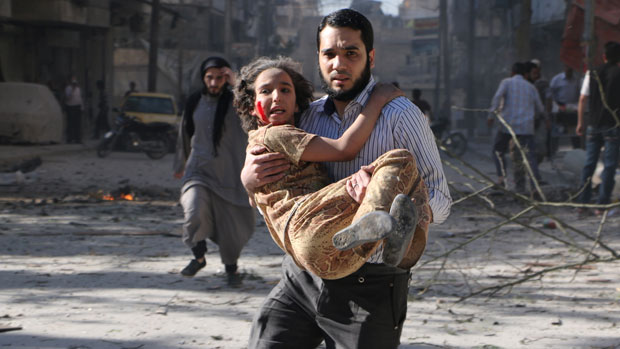Barrel bombs: why are they taking such a toll on Syria?
Syria's biggest city is under constant attack from barrel bombs dropped by government helicopters

A free daily email with the biggest news stories of the day – and the best features from TheWeek.com
You are now subscribed
Your newsletter sign-up was successful
CIVILIANS in the besieged Syrian town of Aleppo are living in constant fear of 'barrel bombs', explosives dropped from helicopters by government forces, the BBC says. The low-intensity bombardment is constant, has killed many, and led thousands to flee the city.
But what is a 'barrel bomb' - and what effect does it have?
What is a barrel bomb?It's the name given to an improvised device - an oil drum, or large empty gas cylinder, packed with explosives and shards of metal to act as shrapnel, dropped from a helicopter. They are "indiscriminate and devastating" says BBC reporter Ian Pannell, the first Western journalist to visit the rebel-held part of Aleppo, Syria's biggest city, this year. While most are 'only' explosive, opposition activists published a video earlier this month alleging barrel bombs had been used to drop chlorine gas near Damascus, The Guardian reports.
The Week
Escape your echo chamber. Get the facts behind the news, plus analysis from multiple perspectives.

Sign up for The Week's Free Newsletters
From our morning news briefing to a weekly Good News Newsletter, get the best of The Week delivered directly to your inbox.
From our morning news briefing to a weekly Good News Newsletter, get the best of The Week delivered directly to your inbox.
How accurate are they?Not very. Originally, the pilots would stay lower to drop the bombs, which allowed them to be a little more precise. But since the rebels acquired portable surface-to-air missiles, the helicopters have flown higher, and the accuracy has decreased. Pannell says the bombs "tumble to the ground - and there's no way of guaranteeing where they land".
How does the Syrian government justify the bombing?The Syrian regime says it is targeting rebel positions, manned by people it dubs "terrorists" - but Pannell witnessed the recent aftermath of a bombing on civilians in a residential area, and videos shot by activist groups appear to show other such incidents. The bombs are believed to have killed hundreds in Aleppo this year and to have maimed many more.
What do human rights organisations say?Even if the Syrian government was sincerely attempting to target only combatants, throwing a barrel bomb out of a helicopter hundreds of metres above the city is not a sufficiently precise way to do so. Human Rights Watch (HRW) has condemned the campaign as "an indiscriminate and unlawful air war against civilians". Spokesperson Sarah Leah Whitson says: "If these indiscriminate, dumb weapons managed to hit a military target, it would be sheer luck." Their use "could well constitute a war crime" according to BBC diplomatic correspondent Jonathan Marcus.
What effect is the bombing campaign having?Last week, CNN reported news from Syrian opposition activists who claimed credibly that an army helicopter had killed 24 people by dropping barrel bombs on a vegetable market. The BBC's Pannell says the bombing doesn't stop "day or night" and adds there is "almost nowhere in Aleppo that could be described as safe". Tens of thousands have fled Aleppo because of the bombs this year, says the BBC. The civil war in Syria has displaced 40 per cent of Aleppo's population - and killed more than 150,000.
A free daily email with the biggest news stories of the day – and the best features from TheWeek.com
-
 The environmental cost of GLP-1s
The environmental cost of GLP-1sThe explainer Producing the drugs is a dirty process
-
 Greenland’s capital becomes ground zero for the country’s diplomatic straits
Greenland’s capital becomes ground zero for the country’s diplomatic straitsIN THE SPOTLIGHT A flurry of new consular activity in Nuuk shows how important Greenland has become to Europeans’ anxiety about American imperialism
-
 ‘This is something that happens all too often’
‘This is something that happens all too often’Instant Opinion Opinion, comment and editorials of the day
-
 Epstein files topple law CEO, roil UK government
Epstein files topple law CEO, roil UK governmentSpeed Read Peter Mandelson, Britain’s former ambassador to the US, is caught up in the scandal
-
 Iran and US prepare to meet after skirmishes
Iran and US prepare to meet after skirmishesSpeed Read The incident comes amid heightened tensions in the Middle East
-
 Syria’s Kurds: abandoned by their US ally
Syria’s Kurds: abandoned by their US allyTalking Point Ahmed al-Sharaa’s lightning offensive against Syrian Kurdistan belies his promise to respect the country’s ethnic minorities
-
 Israel retrieves final hostage’s body from Gaza
Israel retrieves final hostage’s body from GazaSpeed Read The 24-year-old police officer was killed during the initial Hamas attack
-
 China’s Xi targets top general in growing purge
China’s Xi targets top general in growing purgeSpeed Read Zhang Youxia is being investigated over ‘grave violations’ of the law
-
 Syria’s Islamic State problem
Syria’s Islamic State problemIn The Spotlight Fragile security in prison camps leads to escape of IS fighters
-
 Panama and Canada are negotiating over a crucial copper mine
Panama and Canada are negotiating over a crucial copper mineIn the Spotlight Panama is set to make a final decision on the mine this summer
-
 Why Greenland’s natural resources are nearly impossible to mine
Why Greenland’s natural resources are nearly impossible to mineThe Explainer The country’s natural landscape makes the task extremely difficult